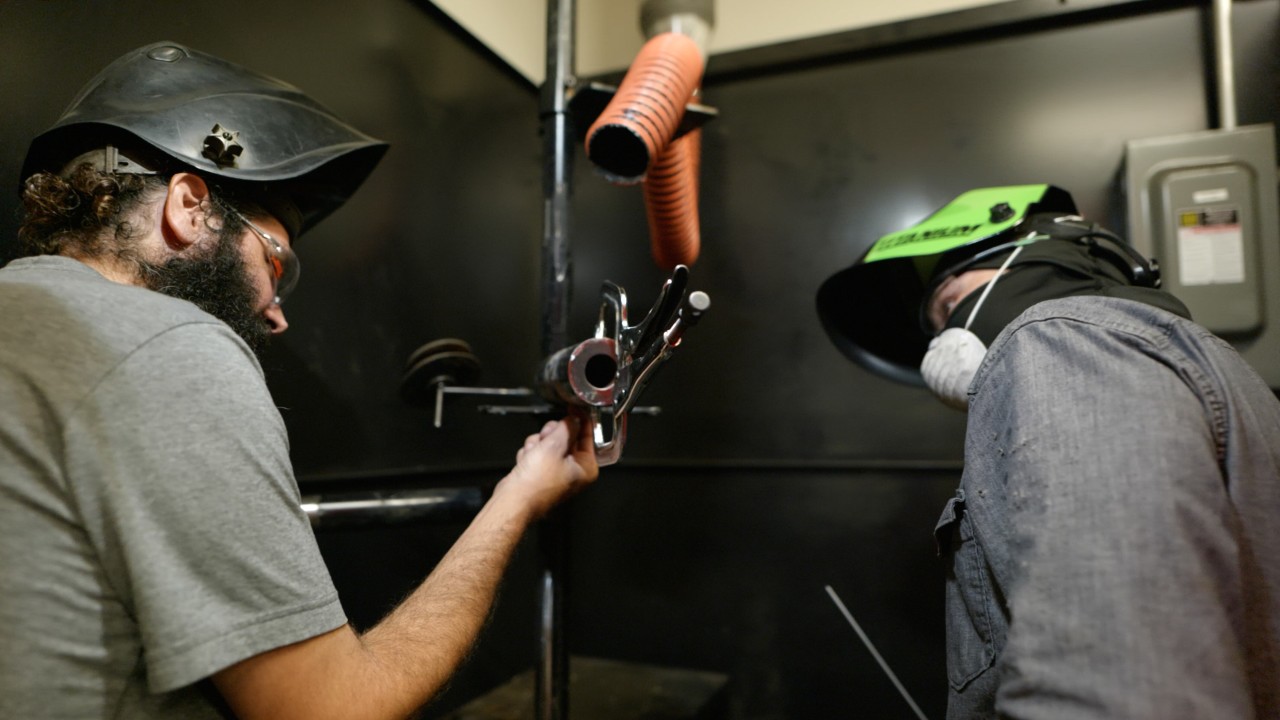The construction, manufacturing, aerospace, and automotive industries rely on welders to cut and join metal objects. Using welding torches and other powerful tools, welders safely complete their tasks with precision. Texas has a high demand for their expertise.
More welders work in Texas than in any other state. In fact, 1 in 8 American welders lives in Texas, making it a great place to attend welding school.
During a welding training program, students learn core principles of welding technology, including pipe welding and arc welding techniques. Similar to other skilled trade programs, welding programs incorporate hands-on training.
Why Attend Welding School in Texas?
Whether interpreting blueprints, measuring metal parts, or inspecting materials, welders draw on their specialized training. Welding schools emphasize the knowledge and hands-on skills that welders need to work in this high-demand field.
What are some of the benefits of attending welding school in Texas?
Accelerated Career Preparation: Welding school typically takes one year or less, making it a fast track to pursuing a role in the workforce. Welding training takes a fraction of the time that a four-year degree does.
Hands-On Training: As a career-focused program, welding technology emphasizes real-world, industry-specific skills. While studying welding technology in the classroom, welding students gain extensive hands-on practice. This training strengthens their understanding of industrial welding techniques.
Strong Demand: Texas reports significantly higher demand for welders than the national average, according to Projections Central, making it a good location to specialize in welding. Several industries with a large presence in Texas, including aerospace and marine construction, rely on welders.
Specialization Options: In Texas, welders work in motor vehicle manufacturing, commercial machinery repair, shipbuilding, and utilities construction. With so many career paths, welding students can find a specialization that fits their interests.
Welding School: Program Duration and Requirements
Welding students graduate with the skills to safely operate and troubleshoot equipment, and to follow applicable welding codes and procedural guidelines. Welding schools in Texas train graduates for careers in this growing field.
Welding School Admissions Requirements
Admissions requirements depend on the program. However, most require a high school diploma or the equivalent. Applicants may also need to submit standardized test scores, such as the Wonderlic Scholastic Level Exam (SLE).
Some programs conduct interviews as part of the admissions process.
Welding School Curriculum
Welders require expertise in electrical design, metallurgy, and physics. Welding schools train learners to weld boilers, boats, aerospace and aircraft parts, and storage vessels.
During welding school, students complete coursework in blueprint reading, welding symbol interpretation, and quality control. Common welding courses include the following:
Cutting processes
Shielded metal arc welding (SMAW)
Gas metal arc welding (GMAW)
Flux-cored arc welding (FCAW)
Pipe welding techniques
Welding fabrication
These courses incorporate extensive hands-on practice with welding techniques and skills.
Length of Welding School in Texas
Welding schools offer a fast track toward seeking a position in the workforce. Full-time students can expect to spend around one year completing their welding education. During that time, they will learn foundational welding knowledge and techniques.
The diploma in welding technology at the Houston South campus of Fortis College takes as little as 48 weeks. In less than one year, welding students can complete their training and qualify for entry-level roles.
Texas Welding Certification
Graduates from Texas welding schools can pursue professional certifications, including those offered by the American Welding Society (AWS). Popular AWS certifications include the Certified Resistance Welding Technician (CRWT), Certified Robotic Arc Welding (CRAW), and Certified Welding Inspector (CWI) credentials. Welders in Texas can also pass a performance-based test to become AWS certified.
Texas also requires a steel structures welding certification to work on transportation structures. The Texas Department of Transportation administers welding qualification tests for these certifications.
Job Outlook for Welders in Texas
Welders in Texas benefit from a very positive job outlook. Nationally, welders are expected to see 1.4% job growth from 2022 to 2032, according to Projections Central. In contrast, the number of Texas welding jobs is forecast to grow by 10.7%.
Growth in the manufacturing sector continues to drive demand for welders who work in facilities that produce machinery and metal parts. Similarly, welders can find many opportunities in infrastructure repair and replacement, including bridges and buildings. Major industries such as oil and gas, manufacturing, and aerospace, are also driving demand for welders in the Lone Star State.
Become a Welder at Fortis College, South Houston
If a career in welding sounds like a good fit, the Welding Technology program at the Fortis College Houston South campus can help. Specialize in welding, cutting, soldering, or brazing while preparing for entry-level welding careers. The program trains you to design, repair, and test welded products. You will also develop your craft skills and welding techniques.
In less than a year as a full-time student, you can qualify for your first welding job. Contact Fortis today to learn more about the welding program.
Recommended Readings
How Do Welding Training Programs Work?
How to Become a Welder
5 Types of Welding Jobs


